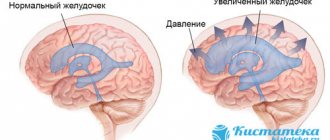Causes of senile dementia
There is a medical classification of the causes of senile degeneration:
- vascular dementia – develops as a result of cerebral circulatory disorders, the cause may be atherosclerosis, hypertension;
- dementia of the atrophic type - this group includes Alzheimer's, Pick's, Parkinson's and others;
- mixed type dementia – when there are vascular disorders in combination with an atrophic process.
Brain tumors, alcoholism, traumatic brain injuries, viral and bacterial diseases of the central nervous system are also common causes of senile insanity.
Next, we will take a closer look at these types of senile degeneration.
Symptoms of brain atrophy and senile degeneration
Symptoms of brain atrophy
Many diseases that cause cerebral atrophy are accompanied primarily by the development of dementia.
The main symptoms are:
- dementia;
- convulsions;
- speech disorders or aphasia;
- memory impairment;
- deterioration of intellectual abilities;
- inability to accurately plan (absent-mindedness);
- disorientation in space;
- repetitive movements;
- loss of consciousness;
- convulsions.
Symptoms of senile degeneration
Early stage symptoms:
- forgetfulness about recent events;
- difficulties in carrying out simple calculations;
- poor orientation in time, location and direction of movement;
- passivity;
- apathy.
Symptoms of the middle stage:
- impairment of cognitive abilities (learning, calculations, calculations, logic, thinking, memory);
- emotional instability;
- excessive agitation or passivity;
- inability to perform normal daily activities (patients need help with household chores - cleaning, cooking, shopping, etc.);
- disturbance of sleep rhythms;
- disorientation regarding the time of day.
Late stage symptoms:
- loss of all cognitive abilities;
Is it possible for cancer patients to have x-rays - find out more information in articles by doctors at the European Clinic.
Vascular dementia
A fairly common type of dementia, it accounts for about 25% of all diseases of this type. The most striking causes are cerebral atherosclerosis and hypertension. As a result of this pathology, chronic oxygen starvation of brain cells develops. Another equally important reason is angiopathy in diabetes mellitus. Congenital vascular anomalies. Vascular degeneration often develops after a stroke. In this case, a huge number of cells of the central nervous system die. Symptoms in this process are focal and will depend on the affected area.
Risk factors:
- obesity;
- sedentary lifestyle;
- arterial hypertension;
- poor nutrition;
- bad habits;
- alcoholism;
- diabetes;
- atherosclerosis of coronary and cerebral vessels.
Alzheimer's type dementia
This is the most common type of dementia. It is quite difficult to distinguish it from vascular degeneration. Therefore, a final diagnosis can only be made posthumously.
Factors predisposing to this type of pathology:
- age – more than 70 years;
- hereditary predisposition;
- female by;
- atherosclerosis;
- endocrine pathology.
Symptoms: it all starts with a decrease in memory, recently occurring events are forgotten, and then long-term memory suffers. Patients become conflicted, demand more attention to themselves, are aggressive, and vindictive. Further, in people with this pathology, brain degeneration progresses, and psychiatric syndromes appear: delusions of persecution, delusions of grandeur, and others. They become sloppy and prone to wandering.
Nootropics, a stimulator of dopamine receptors in the central nervous system, and acetylcholinesterase inhibitors are also indicated in the treatment.
Alcoholic dementia
Appears in people who abuse alcohol for 10-20 years. Under the influence of strong drinks, millions of brain cells die, which leads to atrophy and has long-term consequences. Patients with this pathology become aggressive, self-centered, intellectual activity is impaired, and they become sloppy and apathetic.
In case of complete abstinence from alcohol, dementia begins to regress. But, unfortunately, it is very difficult to motivate people with the third stage of alcoholism; if this happens, it is a real miracle.
Brain degradation – symptoms, causes, how to avoid |PATHS TO HEALTH
Hello, friends! Today is the most important, burning topic: Brain degradation - symptoms, causes, how to avoid it.
There is an expression (most likely, suffered by the relatives of a person with a degraded brain): If God wants to punish someone, then he deprives him of his mind.
This is because mental loss is almost untreatable. And no amount of money will help here. For example, US President Ronald Reagan spent the last years of his life mentally retarded. Surely, among the readers there will be those who have relatives with similar problems.
I personally know such a family. A friend of mine had to care for her sister for more than two years, who had severe brain degradation that turned into dementia. Over these years of care, it has dried up like a piece of wood. After all, my sister needed every minute supervision. But severe brain degradation did not set in immediately. She developed strange behavior decades before the final, irreversible form.
Therefore, it is much more important to know the symptoms and causes of brain degradation and take all possible measures to avoid it. You need to watch yourself and your loved ones before brain degradation has yet grabbed a person in its tenacious clutches and you can still stop it.
Symptoms of brain degradation
Brain degradation manifests itself in the following symptoms:
- Cannot concentrate on his main activity for a long time. Brain degradation begins with an inability to concentrate. For example, a schoolchild cannot concentrate on doing his homework.
At the same time he looks at his notebook. and on a tablet with a cartoon. An adult cannot read more than one page of a book. Because something constantly distracts him or diverts his attention to another object. He rarely finishes things. - Memory is severely weakened.
A person complains that his memory is failing. He cannot find the right words in his speech. Can't learn a poem. His speech becomes word-poor and monotonous. He is only interested in topics where he doesn’t have to think. Conversations are primitive. - Constantly watches TV shows or surfs the Internet. Brain degradation begins with using every minute to talk or constantly calling on the phone.
Doesn't give himself a chance to relax.
Causes of brain degradation
There are many reasons for brain degradation, the main reason is our ignorance towards our body, the desire to go with the flow thoughtlessly.
I will name a few main reasons here:
- Bad foods and drinks.
Harmful foods and drinks lead to brain degradation
They were discussed in the article on the functions of lymph. When the lymph is contaminated, the body’s systems fail, and what is especially dangerous, the most complex and therefore most vulnerable part—the brain—fails.
- Lack of movement. Constant sitting impairs the body's cleansing abilities.
- Wrong dream. It is necessary to comply with the conditions for recovery of the body during sleep. Go to bed 2 hours before midnight, wake up at dawn. Only then will all organs have time to recover. There are people who like to go to bed long after midnight and get up almost after lunch. And although they sleep a lot, they do not restore their body and early acquire brain degradation.
- Smoking and alcohol. They weaken and even destroy connections between neurons in the brain.
Smoking gradually leads to brain degradation
Alcohol leads to brain degradation.
- General anesthesia increases the likelihood of developing senile brain decline by 35%. This is confirmed by American scientists who obtained statistics for more than 9,000 people. They also argue that both general and local anesthesia are dangerous to brain function and can lead to brain degradation. https://www.gazeta.ru/health/2013/05/31_a_5364385.shtml
- But the trend that has emerged in recent years , the incessant use of mobile phones, is especially scary due to its massive reach and epidemic It reached all people, especially schoolchildren and youth. A person will not give his brain rest for a minute. And he sits constantly, for example, with a mobile phone, a computer, a TV. Computer games also cleverly draw people into their networks, especially children. A person watches, reads and... immediately forgets. Why? Because the brain never rests . By analogy, try doing physical labor without rest for 16 hours straight! Your body will go on strike very soon.
It’s the same with the brain: you overloaded it, didn’t give it rest, so it stops working altogether.
Brain overload from mobile phones leads to brain degradation
Look around you: people are walking and looking at their phones as they go. Such people are dangerous, they can push you, they can create an emergency traffic situation. This means that they have forgotten how to think.
Brain degradation - inability to look away from the phone
Those who look at gadgets on the go have voluntarily enrolled themselves in the cohort of people with brain degradation. So now it has become very easy to distinguish them, people with brain degradation, from the general mass of people.
Constantly watching TV shows leads to brain degradation and body diseases
I know people who can't do without TV shows. They can't even fall asleep unless the TV is on. I had a neighbor like this in a sanatorium.
She couldn't do without TV at all! And even late at night I fell asleep to it. Can you imagine my torment with such a neighbor! I am disgusted by the violent programs that are being broadcast now.
But as soon as I turned off the TV, she immediately woke up and turned it on again.
Constantly turned on TV leads to diseases and brain degradation
This neighbor, by the way, who called herself a doctor (!), listed to me her numerous and serious illnesses. She has so many of them that I’m even tired of listening!
I explained to her where her illness came from. From TV shows:
When she falls asleep and her consciousness turns off, this information is caught by the subconscious, which never sleeps and does not critically evaluate the information. And on TV there are almost always scenes of violence! It is possible that the 25th frame from the television program is aimed at destroying health.
The neighbor, of course, was shocked that I opened her eyes to the source of her illness. Do you think she took action? No! She has already developed too strong an addiction. Tele-Addiction to Tele-Poison. She is not being treated.
Cell phone calls overload your brain
There are people who constantly call someone. There are those who always, no matter what they are doing, always answer calls immediately. But this is sometimes very dangerous: for example, when driving a car.
Let us remember that mobile phones are a radio station, a source of powerful electromagnetic radiation that destroys the body, hearing, and brain.
Talking on the phone while walking with a child leads to a loss of emotional connection with the child and brain degradation on both sides
The path to brain degradation in both mother and child
How often can we observe: a young mother is pushing a stroller with a child and spends the entire walk talking to someone on the phone. Her child is neglected, she does not believe that she needs to talk to him in the first place.
Now even strollers are made so that the child in the stroller does not see the parents, and the parents do not see the child. And parents don’t understand that such a stroller degrades the brain not only of the parents, but also of the child!
When does brain degradation begin?
So, the degradation of the brain, the loss of your mind, began the moment you stopped giving your brain rest. Your brain has become constantly in touch with everyday sources of information - telephone, TV, Internet, newspapers, etc.
And it doesn’t matter whether you were forced to do this by official duties, or because you have nothing to do. The result is the same: brain degradation.
Why aren’t all the bells ringing that there is now massive brain degradation going on?
Answer: Nowadays society is ruled by money. In order to receive a lot of money from the population, it is advantageous for them to be sick and not thinking. So it’s naive to expect help from a kind uncle.
This situation is very beneficial to the ruling circles. They openly say: “Our job is to sell people not what they want , but what we need .” (CBS News President Richard Salant)
How to avoid brain degradation
Firstly , you need to respect your mental activity, respect yourself. Do not allow extraneous thoughts, desires, or people who like to call to interfere with the process of mental activity.
Secondly, you need to improve your culture of thinking and demand that others respect your brain activity, so that no one distracts you.
Thirdly , it is necessary to take breaks from mental activity. For example, I worked at the computer for half an hour, then took a 15-minute break.
Fourthly, we must remove from ourselves the causes of brain degradation from the physical side, namely:
Wrong foods and drinks.
Inadequate sleep.
Physical inactivity is insufficient physical activity.
Alcoholic drinks, smoking, being in a smoky place.
Avoid anesthesia (both general and local). Nowadays in dentistry they use painkilling injections. The doctor does not always warn that this is dangerous - the teeth and brain are located close. But you need to know that you can ask for milder pain relief - by spraying and spraying an anesthetic.
Refusal of anesthesia will prevent brain degradation
Fifthly, learn to work concentratedly on your tasks again, without distractions. At the same time, follow the regime: work - break.
Sixth, learn poems, songs, and passages of prose from good fiction books by heart.
Results
In this article, we looked at the symptoms, causes of brain degradation and how to avoid it.
- Symptoms appear long before a person's brain begins to deteriorate. Therefore, you need to be attentive to your surroundings and, above all, to yourself for incipient dementia, i.e. brain degradation.
- Brain degradation occurs at a particularly rapid pace when the brain is constantly connected to a source of information - TV, telephone, Internet, newspapers, when the brain has no respite.
And this connection is almost always voluntary and addictive, like a drug.
This drug addiction is difficult to treat; some believe that it cannot be treated at all.
And since this phenomenon has become widespread, a mass dullness has actually occurred.
- And it cannot be stopped with drugs. You can stop it only with a conscious attitude towards yourself - give your brain a rest, disconnect it from information. Otherwise, children, adults and youth with gadgets in their hands will turn into morons, omnivorously consuming any information, unable to distinguish truth from lies.
- You need to make it a rule: your mobile phone should be turned off when you are busy with your mental activity. You need to turn it on when you take a break from your activities; fortunately, the phone has a call alert function. I understand that many people shudder at the thought of turning off their phone. This is because they are addicted to this drug.
- And finally, learn good poems, songs by heart, and read classic books. Retell texts. It’s difficult, it’s like withdrawal from drugs, but it’s a way out of the dead end of brain degradation.
Friends, listen to the amazing song of ROBIN HEARING THE VOICE performed by the VERASA ensemble:
Alexander Tikhanovich ROBIN HEARING A VOICE
Alina Taranets
Source: https://putikzdorovju.ru/degradatsiya-mozga/
Senile dementia
Probably each of us has noticed that older people become forgetful and their character traits change. They become grumpy, stubborn, and will stand their ground to the last. This happens due to the aging and death of brain cells, which results in the development of prussic dementia.
Symptoms: first, short-term memory begins to weaken, and then they no longer remember what happened 40-50 years ago. There are volitional disorders: inactivity, lack of initiative, useless fussiness. Violation of desires and behavior. At night, patients suffer from insomnia, but they can sleep peacefully all day.
Changes occur in the emotional sphere: they become more vulnerable, any little thing can make them cry, and they require increased attention to their person from others. Mood swings are typical. Sometimes apathy occurs. They also often have hallucinations. Psychosis is an integral part of this disease, which can cause health problems: increased blood sugar, drop in blood pressure.
To treat this type of dementia, experts believe, it is better to choose a sanatorium in this area. There, sick people have the proper care they need. Appropriate treatment will be carried out and not only medication - nootropic drugs, drugs that improve blood circulation in brain cells, vascular drugs, but also physiotherapy, such as electrosleep, electrophoresis with medications. Massage of the cervical-collar area. Walking in the fresh air has a beneficial effect on brain activity.
Brain degradation - read by EVERYONE!
Every day more and more people complain about problems with brain activity - about increasing absent-mindedness (i.e., the inability to concentrate one’s attention, to gather thoughts to solve some problems), about difficulties in remembering information, about the physical inability to read large texts , not to mention books.
And they ask to give them something to improve brain activity in general and memory in particular. Moreover, paradoxically, this problem is typical not only and not so much for older people, whose brains are supposed to be weakened by age, but for people of middle age and younger than middle age.
At the same time, many are not even interested in why this happens - they automatically attribute it to stress, fatigue, unhealthy environment, the same age, etc., although all this is not even close to the reason. Among my patients there are those who are far from 70, but who have no problems at all with either memory or brain activity.
So what is the reason?
Real drug
And the reason is that, despite any arguments, no one categorically wants to give up the so-called constant, round-the-clock “connection to information.”
In other words, the accelerated loss of your brain functions began on that very significant day when you decided to be constantly “in touch” .
And it makes no difference whether you were forced to do this by work necessity, languor from idleness, or an elementary fear of not being “on the level”, i.e. fear of being branded a black sheep, an eccentric among one’s own kind.
Back in 2008, it was known that the average Internet user reads no more than 20% of the text on a page and avoids large paragraphs in every possible way! Moreover, special studies have shown that a person constantly connected to the network does not read text, but scans it like a robot - snatches scattered pieces of data from everywhere, constantly jumps from one place to another, and evaluates information exclusively from the position of “sharing”, i.e. e. “Can this “revelation” be forwarded to someone?” But not with the purpose of discussing, but mainly with the purpose of evoking emotions in the form of an animated “burp”, accompanied by short remarks and exclamations in SMS format.
During the research, it turned out that pages on the Internet, as already mentioned, are not read, but are skimmed using a pattern reminiscent of the Latin letter F.
The user first reads the first few lines of the text content of the page (sometimes even completely, from beginning to end), then jumps to the middle of the page, where he reads a few more lines (usually only partially, without reading the lines to the end), and then quickly descends to the very bottom of the page - see “how it ended.”
Red - areas where the reader’s attention lingers the longest. Yellow - quick viewing zones. Blue and gray areas are not readable at all
Therefore, the most effective way to present information to the average Internet user is to display information in the form of an inverted pyramid (i.e.
according to the principle “the lower, the less”) with the obligatory highlighting of keywords (so that consumers of information understand what is important and what is not so important) and the disclosure of no more than one thought per paragraph. This is the only way to keep your attention on the page for as long as possible.
If, as you go down the page, the density of information does not decrease or, even worse, increases (as, for example, in this article), then only a few people stay on such pages.
My personal opinion is:
The Internet is a real drug. What is a drug? This is a completely useless thing, without which anyone can live perfectly well until they try. And when he tries, he becomes dependent for life—drug addiction cannot be cured.
People of all ranks and specialties complain about problems with the perception of information - from highly qualified university professors to service workers who maintain washing machines. Such complaints can be heard especially often in academic environments, i.e.
from those who, by the nature of their work, are forced to communicate closely and daily with people (teach, give lectures, take exams, etc.)
e) - they report that the already low level of reading and comprehension skills of those with whom they work is falling lower and lower from year to year.
Most people have enormous difficulty reading large texts, let alone books.
Even blog posts longer than three or four paragraphs already seem to most to be too difficult and tedious to understand, and therefore boring and not worthy of even basic understanding.
There is hardly a person who has not heard the popular online saying “too many letters - can’t handle it ,” which is usually written in response to a proposal to read something longer than a couple of dozen lines.
It turns out to be a vicious circle - there is no point in writing a lot, since almost no one will read it, and reducing the volume of transmitted thoughts leads to even greater poverty of not only readers, but also writers. As a result, we have what we have—mass dullness.
Even people with (in the past) good reading skills say that after a whole day of surfing the Internet and maneuvering through dozens and hundreds of emails, they physically cannot begin even a very interesting book, because reading just the first page turns into real torture.
Reading simply “doesn’t work”, first of all, because:
a) I can’t force myself to stop scanning the text, looking for keywords in it
b) the complex syntax characteristic of most classical, high-content or knowledge-intensive works is completely inaccessible, which is completely absent in the exchange of telegraphic “SMS burps”.
As a result, one sentence has to be re-read several times! The most outspoken people say this directly: I am disgusted/disgusted with myself.
https://www.youtube.com/watch?v=1LOTnbsYVPk
But that's not all.
Due to constant connection to the Internet, such human skills as the ability to return to once meaningful information, analyze what has been read, and connect the imagination sharply deteriorate.
What’s even worse is that in 80% of cases, people go to the Internet for dubious entertainment, or get information from there that has not only zero, but negative cultural value.
At the same time, most people (especially young people) are so attached to their gadgets that if they threaten to be disconnected from the network for at least one day, they experience not only mental depression bordering on panic, but also real physical withdrawal, reminiscent of drug addiction. Don't believe me? Come on, turn off your soap dish COMPLETELY and try to live without it for at least 2-3 days.
There is an opinion, which I fully share, that the ability to effectively perceive complex texts and read complex literature will soon become an elite privilege, available only to a special caste of people.
This idea is not new, since Umberto Eco, in his novel “The Name of the Rose,” proposed that only those who can and are ready to perceive complex knowledge should be allowed into the library.
And everyone else will be able to read only signs and the Internet.
In short, no pills, no supplements, no diets, no shrinks, etc. unable to stop brain degradation.
There is only one thing that can stop it - stopping the flow of all kinds of information garbage into the processing system and daily loading the brain with so-called “useful information.”
This process is extremely difficult, and for many people it is completely impossible. For many, the train, as they say, has already left.
Once again, briefly:
1. Gadgets that ensure your constant connection to information/Internet - smartphones, iPads, etc.
, without which you now can’t even go to the toilet, make you practically a moron with a sluggish, apathetic, barely thinking brain that is incapable of thinking and analyzing .
But, like any drug addict, you, of course, are convinced of the opposite - that these soap dishes make your life unrealistically bright, rich, comfortable, etc., and you personally - a “highly advanced personality” who is always in aware of everything.
2. Thanks to these devices, your brain receives a continuous stream of all kinds of garbage around the clock, which pollutes your “on-board computer” so much that you are only suitable for performing the most primitive, low-skilled work. You are unable to speak, write, or read coherently—your speech is tongue-tied and filled with filler words.
When telling someone about something, you have difficulty finding the right words, and when listening to someone, you quickly lose the thread of the conversation and begin to get bored and yawn. You can’t write because you start making mistakes in almost every word, and you don’t even know approximately how to use punctuation marks.
But you are great at taking selfies (and other trash photos) and knocking on someone on Viber or WhatsApp.
3. In short, listen to the bad news: mobile communications should only be used in EMERGENCIES. For example, you arrived in an unfamiliar city and cannot find a greeter - you really need to call.
Or you are late for an important meeting - it is really necessary to call, i.e. you need to configure your gadget only to receive or transmit the professional and business information you need. And the rest of the time your gadget should be OFF.
However, I can imagine how uncomfortable you feel just thinking about it.
4. You need to be prepared for the fact that everyone around you, to put it mildly, will not understand you - they will tell you that you are hello, completely cuckoo, that you have gone crazy, etc. Don't care and grind. Remember, you are a target for information attack and you need to defend yourself. As CBS News President Richard Salant said, “Our job is to sell people not what they want, but what we need.”
5. And finally, you need to relearn how to read books . Real paper books—get it? Don’t stare at your soap dish with a screen for hours with blind eyes, but read books. It will be hard, but you try.
There is no need to force yourself - on the first day, read half a page, on the next - a whole page, on the third day - 1.5 pages, etc.
Keep in mind that the body will resist this in every possible way - it will feel nauseous, break down, and be tempted to do anything, as long as the brain does not strain.
I don’t wish you good luck, because it’s not what you’ll need at all. published by econet.ru
A.N. Statskevich, Brain degradation // “Academy of Trinitarianism”, M., El No. 77-6567, pub. 21867, 03/07/2016
PS And remember, just by changing your consumption, we are changing the world together! © econet
Source: https://econet.ru/articles/109152-degradatsiya-mozga-chitat-vsem
Epileptic dementia
This pathology develops secondary to the progression of the underlying disease – epilepsy. But the cause of this type of dementia can be not only epilepsy, but also its consequences: traumatic brain injury from a fall during an attack, a consequence of taking antiepileptic drugs, death of brain cells due to oxygen starvation.
Signs: there is a decrease in memory, both short-term and long-term. The thinking process is disrupted. Lack of interest in anything. Often cannot express the main idea because he lingers on minor details. The vocabulary of such patients is not rich. There is a change in character traits - they become cruel, vengeful, selfish, almost all words are used in a diminutive form.
Establishing diagnosis
To make an accurate diagnosis, an anamnesis is collected. On its basis, symptoms are differentiated from depression, severe asthenia and iatrogenic mental disorders (delirium, malingering, and others).
When examining a patient, a neurologist identifies focal symptoms, extrapyramidal disorders and disturbances in walking.
The final diagnosis is made based on the results of magnetic resonance imaging and laboratory tests of the patient.
Article on the topic: How to treat arthrosis of the elbow joint with drugs and exercises?








